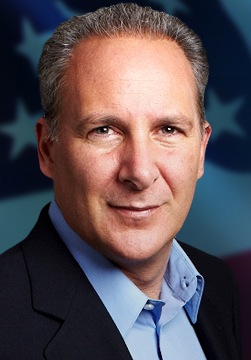China's Peg was America's Crutch
One week after China's decision to scrap its dollar peg, the Bank of China has already back- peddled, warning currency traders not to expect any further appreciation of the yuan. This rhetoric seems at odds with last week's announcement, in which China revealed that the yuan, now pegged to a secret basket of currencies, would be allowed to appreciate as much as .3% per day. While .3% may not sound like much, in the foreign exchange world it's huge. If repeated daily, it amounts to over 2% per week, 8% per month, or over 100% per year. With leverage, buying the yuan could be the trade of a lifetime. No wonder Chinese monetary authorities are trying to discourage speculators.
However, despite official warnings to the contrary, the yuan will likely rise much higher than its initial 2.1% revaluation. In fact, upon reflection, it appears that China's currency peg recently acted as America's economic crutch. The initial reason for the peg was to create confidence and stability in the yuan, by pegging it to the stronger dollar. During the Asian economic crises in 1997, as currencies throughout the region plunged, the yuan held firm. During the "king dollar" days of the late 1990's, as the tech bubble and "new era" psychology propelled the dollar higher, the yuan went along for the ride. It was only in the post-tech bubble days, that the peg became an anchor, acting not as the floor it was designed to be, but as a ceiling.
The reality is that it is not the yuan that needs a peg, but the dollar. It makes no economic sense for a nation to restrain the appreciation of its own currency. A rising currency means increased purchasing power, lower interest rates, and a rising standard of living. It is the market's way of rewarding a nation for its enhanced productivity. China's refusal to partake makes no sense whatsoever. Offering these fruits to Americans instead makes even less sense. My guess is that despite its claims to the contrary, China finally understands this reality, and has adopted a "strong yuan policy." However, unlike America's farcical "strong dollar policy," China's policy actually has teeth.
Contrary to government and Wall Street rhetoric, an appreciating yuan is not good news for America, or its financial markets. Maintaining the peg forced China to extend enormous subsidies to both American consumers and borrowers. Now that the peg/crutch is gone, the subsidies soon will be as well. In the global auction for scare resources and consumer goods, Americans will eventually be out-bid by increasingly wealthier Chinese.
Some have incorrectly argued that a rising yuan will make American exports more competitive in China, and therefore benefit our economy. Such a simplistic analysis is flawed, as its proponents fail to comprehend the basics of international trade. The only reason our exports become more competitive is that we will be selling them for fewer yuan. In other words, we will now be forced to pay the Chinese more yuan to purchase their products, but in return receive less yuan for the products we sell them. The bottom line is, paying more and getting less is a bad deal for Americans.
In addition, within minutes of China's announcement, Malaysia revealed that it too had abandoned its dollar peg in favor of China's basket strategy. In fact, China's announcement basically gives all Asian central banks the green light to sell their dollars as well. The ultimate implications for Asians and Americans are enormous. For Asia, it means greater purchasing power, higher real incomes, and rising standards of living. Asian citizens, particularly the Chinese, will no longer have their own purchasing power suppressed by their governments and transferred to Americans. They will finally be able to enjoy the fruits of their own labor, savings, and productivity.
For Americans, the opposite will be true. This change will result in reduced purchasing power, lower real incomes, and a falling standard of living. The Chinese will no longer be subsidizing American consumers and borrowers with low import prices and interest rates. Without these supports, consumer prices and interest rates will rise, credit and the economy will contract, stock and real estate prices will fall, service sector jobs will be lost, the federal budget deficit will worsen, and the dollar's decline will accelerate.
Specifically, the race to get out of dollars is also a race to get out of treasuries, mortgage-backed securities, and any other U.S. dollar-denominated debt. When the largest buyers of U.S. debt stop buying, or worse yet start selling, interest rates could sky rocket. As credit contracts and interest rates surge, home prices will plunge, wiping out trillions of dollars of paper equity for millions of American homeowners. However, while the equity will vanish, the mortgage debt will not only remain, but be that much more costly to service. Imagine the implications for the U.S. economy and dollar-denominated financial assets, should this financial nightmare become a reality.
If you have not yet done so, download my free research report at www.researchreport1.com, and get out of the dollar before the race turns into a stampede.
July 28, 2005
Peter D. Schiff
President/Chief Global Strategist
Euro Pacific Capital, Inc.
20271 Acacia Street, #200
Newport Beach, CA 92660
Toll-free: 888-377-3722
Direct: 203-972-9300
Fax: 949-863-7100
For those of you still holding onto portfolios heavily weighted in U.S. dollars, time is running out to protect your self. To learn about specific strategies specifically design to benefit from China's action, please contact my office directly, visit my web site www.europac.net, or download my free research report The Powerful Case for Investing in Foreign Equities at www.researchreport1.com

















